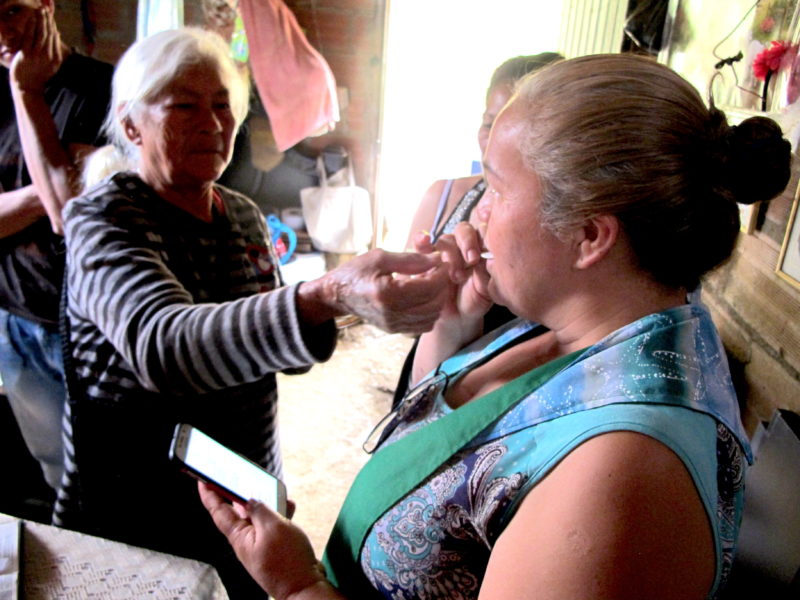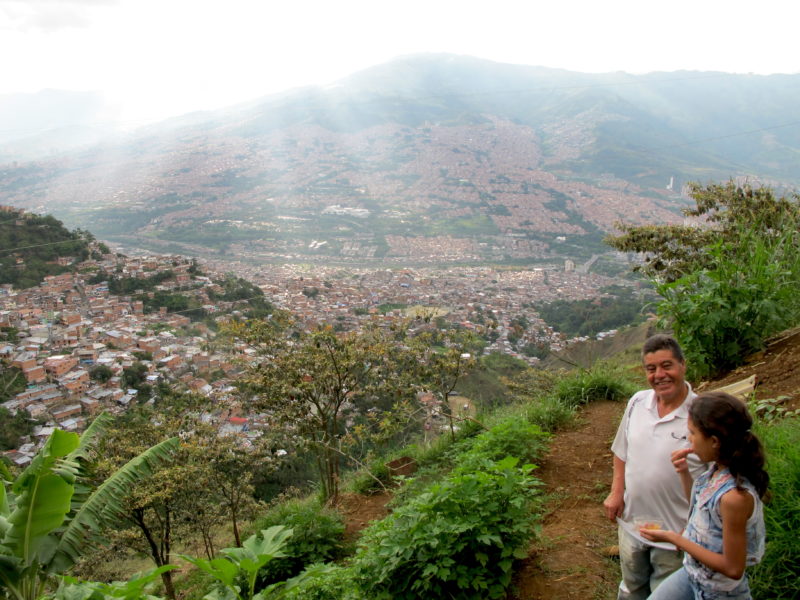(translated from German article)
 |
| Olga Lucia Alvarez ARCWP |
Colombian is the first Catholic woman priest and bishop of Latin America. She was consecrated against the resistance of the official church in Rome.
By Katharina Wojczenko, Medellín
Olga Lucía Álvarez Benjumea does not let herself be disturbed - not by the chickens under the altar, not by the rabbit hovering over her feet during the sermon, not by the boy's cellphone ringing at the reading. And certainly not from the bus that crashes every few minutes outside over the potholes and fills the house with exhaust fumes. Grandmother Anita Manco, 86 years old, has a sore leg. Her children have invited Olga Lucía Álvarez to her home so that she can celebrate the Holy Mass with her family and donate the Anointing to her grandmother.
With the pink sneakers, the pink backpack, the white blouse and cherry red pants reminds the 77-year-old to a feisty schoolgirl. If there were not the simple metal cross on her chest. She does not need her own house of worship. For the service she hands the room in the bare-plastered house with tin roof, where grandmother Anita lives. The family has set the table with a white cloth.
This is her altar on which she prepares the plastic box containing the hosts, the small wine bottle, the goblet and her bible. The grandmother's bed and several plastic chairs are the pews. Two daughters, one son, one son-in-law and three grandchildren have come. Álvarez puts on a stole, which is colorfully embroidered with female saints. She hugs and kisses everyone in greeting. Touch is at least as important to her as the words.
She encourages people with the Bible
When she wants to make the Word of God understandable, she becomes loud, whispering, almost promoting. Like the biblical passage about the healing of the mother-in-law of Simon Peter, who chose the family for the reading. In the Aramaic, the language of Jesus, he did not roughly say "Stand up!" As in the translation. But: "You can get up." You have the dignity to it, you have the spiritual power, you are capable, she explains. "He motivated her, he took her fear and pain," says Alvarez. "Everything depends on us. The Spirit of God is in us - we just have to allow it, strengthen it. "
Becoming aware of his dignity and acting on his own: Olga Lucía Álvarez Benjumea has already preached this to many people in difficult life situations when she was not even a priestess. Growing up in a village in the department of Antioquia, she got to know Colombia's social problems at an early age. There were several illegal mines and over decades repeatedly disappearances and massacres of the poor population.
Her mother was a deeply religious woman. She gave her Catholic faith to her children. Of the six siblings, two became priests - and one priestess. Already as children, they played church at home, held masses and processions. The altars were tinkered with mother's newspaper. The pastor played the siblings alternately. "My mother never said: Olga is not allowed to do that," remembers Alvarez.

She became a Catholic Lay Missionary, working with Afro-Colombians and Indians, in places accessible only by boat or donkey, and with people in the slums of big cities. She listened to them, talked to them about the gospel, and tried to find practical solutions to their problems; for example, by building workshops and encouraging women to study.
As a priestess, she continues to go where she is needed. She works with women released from prison, who have no one to talk to, with prostitutes and visits families who invite them.
On a ship near Passau the first priestesses consecrated
Ih ren beginning took the international priestesses movement in Austria . Founder is the former Benedictine and teacher Christine Mayr-Lumetzberger. "In the 70s, we women were expected to open the offices," says the bishop today. But Pope John Paul II declared the question of the ordination of women ended. That's why 20 years ago Mayr-Lumetzberger developed a training program for priestesses. 2002 excommunicated by the official church bishop and Argentine liberation theologian Romulo Braschi ordained i the first seven women priests - on a boat on the Danube near the Lower Bavarian Passau.
Today there are about 300 Roman Catholic priestesses worldwide. The most common is the movement in North America. In Latin America, there are currently ten, nine Colombians and one Venezuelan, plus seven candidates. There are about 20 priestesses in Austria and Germany, most of whom work in secrecy - mainly because of their additional role within church organizations. Guilt is the Concordat, the State Treaty with the Church. A
If they knew what they were doing, their job would be at stake . Those priests who work with the women or allow them to officiate in their churches also want to remain unrecognized. "Thanks to word-of-mouth, they have a lot to do with baptisms, weddings, worship and pastoral care," says Mayr-Lumetzberger.
What Women Worldwide Share: They have a family behind them and are financially independent. That's important because the priestesses do not deserve anything. Also Álvarez decided only for this step, when she was already retired. Partner or children does not have them. Marriage, partnership, divorce or homosexuality, however, would not be an obstacle to a priestly ordination.
"I have read the Gospel and felt liberated," explains Alvarez, "I feel obliged to liberate others." She did not want to convert. "I have never gone through the slums and injected with holy water around me, but have lived my faith." Everything else can not be reconciled with the church's crimes against the indigenous people during the colonial era.
Above all, she worked for years alongside Bishop Gerardo Valencia Cano, whose secretary she became. Valencia was Bishop of Buenaventura, until today an area of violence and poverty on the Pacific coast with mostly Afro-Colombian population. He not only deliberately promoted female missionaries and allowed them to take on these priestly duties. Valencia was a passionate exponent of liberation theology, whose child Álvarez calls herself.
This theology developed in the 1960s in several Latin American countries. The trigger was social injustice. The Liberation Theologians interpreted the Bible out of the experience of the poor. They wanted to help them to free themselves from exploitation and oppression - instead of waiting for salvation.
For the poor against resistance
The Liberation Theologians stood in the wings - in the dictatorial regimes, in the Roman Catholic Church, which often cooperated with these regimes, and in those who had power or socialism behind it. Repeatedly priests were murdered, even in Colombia. Armen Bishop Valencia died under dubious circumstances in a plane crash. The Liberation Theology office in Bogotá, where Álvarez worked, has been repeatedly attacked.
At the same time, Latin American liberation theology had far-reaching consequences for the Catholic universal Church. This was the experience of Álvarez in 1968 in Medellín as secretary of the General Assembly of Latin American Bishops. The bishops denounced the social injustices and, with the Pope's approval, raised the so-called option for the poor as a guideline of the church - that is to say that it wants to seize a special party for the poor - a thought that Pope Francis took up again.

Álvarez was there when a minority movement developed against the resistance of the church hierarchy and the world church finally changed. She hopes the same for the women's priest movement. In most Protestant, Anglican and Old Catholic churches and other Christian communities, women's ordination is allowed. Converting is out of the question for them, because their goal is nothing less than the revolution of the Roman Catholic Church.
Rejection of women's ordination is controversial in the church
But the bishops in the Vatican continue to reject the ordination of women. Canon law allows consecration only to a baptized man. Theologically, this is controversial. Advocates of women's ordination point to Mary and Mary Magdalene, whom the risen Jesus Christ was the first to ask to spread the Gospel around the world. The retired history and theology professor Dorothy Irvin of the University of Tübingen has found in excavations evidence from the first eight centuries after Christ that women were active as Christian priestesses.
In 2016, Pope Francis set up a commission on the issue of the women's consecration - the lowest of the three consecration levels (deacon, priest, bishop), which until now have only been reserved for men. However, he dampened the hope for change: The Commission should only examine the historical role of deaconesses in the early church. The result is still pending. "I like Francis very much," says Olga Lucía Álvarez, "but he is like the friend who tells you many beautiful things, but never talks about marriage."
On the occasion of his visit to Colombia in 2017, she wrote an open letter to the Pope, offered him her services and asked him for an interview. An answer she did not get until today. "But since then, I have regularly posted visits from the Vatican to my website, " says Alvarez. She is convinced: "Sooner or later that will come. We have laid the foundations. "The faithful would always have accepted her as a priestess. Or with Grandma Anita's words: "You can learn everything - even as a woman!"

No comments:
Post a Comment
Note: Only a member of this blog may post a comment.